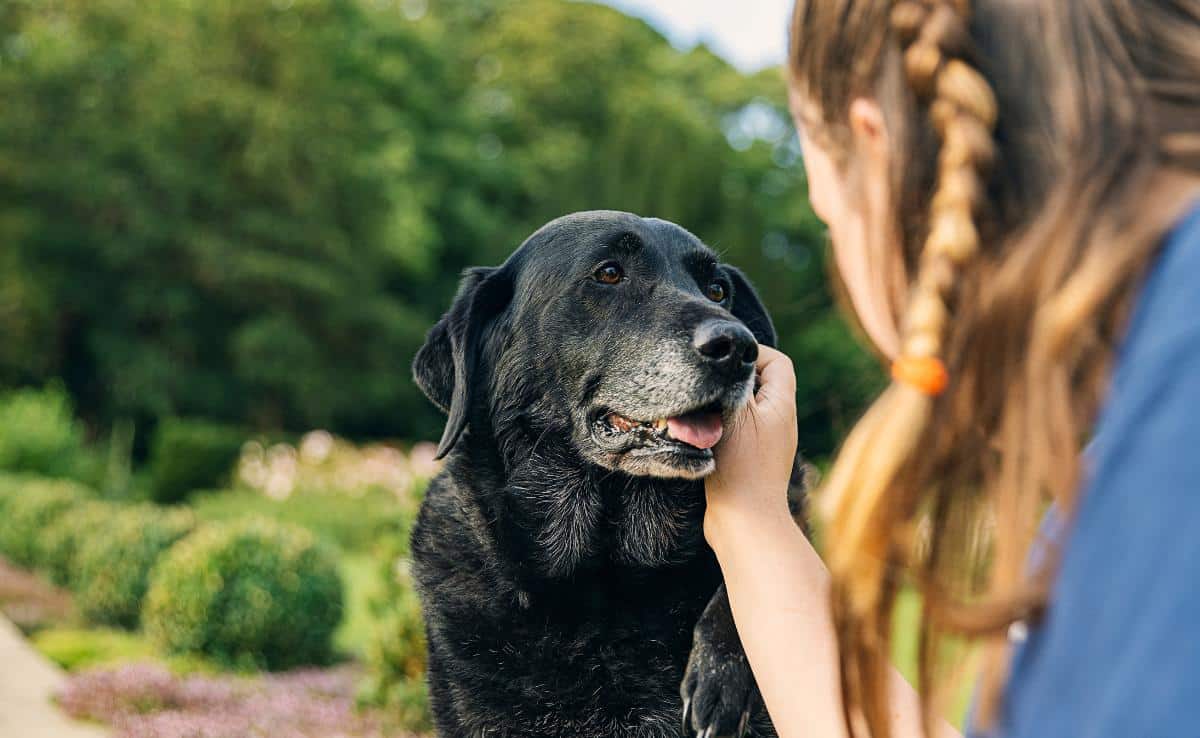How To Care For A Senior Dog: Keeping Your Old Pup Happy & Healthy
When you purchase through links on our site, we may earn a commission. Here’s how it works.

You may not realize some of the extra special care, and attention older dogs need. Knowing the signs of aging and the increased health issues to look out for can help you catch many medical problems as early as possible. Also, as your pup’s mobility decreases and regular bodily functions begin to show signs of old age, we give you some tips on how to help your elderly pup live a happy and comfortable life in his senior years.
Table of Contents
When Is A Dog Considered A Senior?
There’s no set senior-citizen age for all dogs because it largely varies by breed and size and other factors that affect their lifespan. In general, small dogs are considered seniors at around 11-12 years of age. Medium-sized dogs enter their golden years at around 10 years old.
For larger dogs, it’s around 8 years old, and giant breeds are usually considered seniors around 7 years of age. However, the specific breed also matters. For example, Cavalier King Charles Spaniels have a shorter lifespan than many other small breeds, so they’re considered senior at about 8 years old.
Initial Signs Of Aging In Dogs
Here are the most obvious signs your furry friend is moving into his twilight years.
- Graying fur, especially around the muzzle
- Thinning coat
- Weight gain
- Stiff or sore joints
- Less energy and tires more easily
- Less tolerant of extreme temperatures
Common Health Concerns In Senior Dogs
Dogs become more susceptible to many of the same health problems we humans face as we age.
- Obesity
- Arthritis and other joint problems
- Cancer
- Heart problems
- Gum disease, tooth decay, or infection
- Incontinence
- Kidney disease
- More frequent gastrointestinal issues
- Hearing and vision loss
- Cognitive dysfunction
How To Care For A Senior Dog
Senior dog care requires more attention to keep your pup as happy and healthy as possible. Here are some necessities and tips on caring for elderly dogs in addition to your normal care routines, such as teeth brushing, coat brushing, and other grooming needs.
1. Increased Veterinary Care
Vet experts, including the American Veterinary Medical Association (AVMA) and the American Animal Hospital Association (AAHA), recommend that senior pets should have routine vet checkups every six months instead of annual visits. Why? Older dogs are more prone to developing health problems, so it’s important for early detection and treatment. In addition to everything vets cover in younger pet exams, routine senior visits can include increased bloodwork, dental care, and other tests.
2. Parasite Prevention & Vaccinations
Vaccines and preventatives for internal parasites (worms), fleas, ticks, etc., are especially important for senior dogs because their immune systems weaken with age, and they can’t fight off diseases and infections as well as when they were younger. This can result in more severe symptoms and longer healing times.
3. Diet & Nutrition
Weight control is essential for dogs of any age, but it becomes even more important as they get older. Excess weight increases the risk of diseases, including diabetes, cancer, and heart, kidney, and liver problems. It also puts a lot of strain on aging joints, which can lead to arthritis and joint injuries. See the best dog food for weight loss if your pup needs to shed some pounds.
Often, senior dogs also require different caloric and nutritional content in their diet or food that’s easier on their digestive tract. The ideal healthy diet can even help delay or support some age-related issues, such as a weakened immune system, arthritis, mental acuity, vision problems, and more.
You may also want to consider supplementing your dog’s diet with CBD or joint supplements to maintain a good quality of life. Discuss your furry friend’s specific nutritional needs with your veterinarian to learn which changes you may need to make.
4. Keep Your Dog Active
Although you may need to moderate your dog’s exercise as he ages, it’s crucial to keep your canine companion as active as possible. Regular, light exercise helps maintain a healthy weight and muscle tone, which are key to delaying mobility problems. While you may need to encourage your dog to stay active, don’t overdo it. For example, if he’s showing signs of being too tired on your regular walking route, you should shorten the length.
5. Mental Stimulation
Like humans, some elderly dogs suffer from a decline in cognitive functioning. But keeping your pup mentally stimulated may help delay this cognitive decline — and keep your dog happy through interactions with you. In addition to general playtime, you may want to introduce some fun brain games for dogs into your pup’s daily routine.
6. Check Regularly For Lumps & Bumps
Take the time to brush your dog regularly, which maintains his skin and coat health. But it’s also an ideal time for you to feel your furball’s body for any lumps or bumps. If you detect any abnormal masses, contact your vet as soon as possible. While not all are major causes for concern, you need a veterinary diagnosis. Nearly half of all dogs over the age of 10 develop cancer, according to the AVMA.
7. Changes In Your Home
Is your pup showing signs of mobility or vision problems? If so, you’ll want to make some changes to keep him safe and comfortable. An orthopedic dog bed can help reduce joint pain by conforming to your dog’s body and supporting pressure points. Place it in an easily accessible location that’s not too hot or too cold.
You may also want to consider getting dog stairs or a ramp so your furry friend can still get on the sofa or your bed, as well as a ramp for getting in your car. Placing carpet runners on slick floors can also reduce slipping. Removing obstacles from the floor and keeping furniture in place can keep pups with fading sight from bumping into things.
8. Pay Closer Attention To Your Dog
Finally, paying special attention to your senior pup is important for many reasons. Older dogs can become more anxious, so lots of love and cuddle time can help ease their insecurity. Keeping a closer eye on your dog can also help you spot more subtle signs of behavior or cognitive changes. Medications and special diets are available that can help manage cognitive dysfunction in dogs.
Behavioral Changes In Old Dogs
As your pup moves further into his senior years, you may notice some of the following behavioral changes. While some of these are normal with aging, the AVMA points out that behavioral changes could indicate a medical condition, so it’s important to contact your vet if your furry friend doesn’t seem like himself.
- Increased irritability or aggressive/protective behavior
- Seeming more anxious or nervous
- Decreased interaction with humans or other pets
- Decreased response to commands
- Reacts more to sounds
- Being more vocal than usual
- Changes in sleep patterns
- Confusion or disorientation
- House soiling
Yes, Doggy Retirement Homes Exist (Video)
This brief video produced by National Geographic shares the heart-warming story of a home that takes care of senior dogs from shelters or owners who could no longer care for their loved ones. It’s also eye-opening about the level of care some old dogs require.
Getting Help With Expensive Veterinary Bills
If you don’t already have pet insurance, you may want to consider it for your aging pup before health problems arise. Policies won’t cover pre-existing conditions, so the earlier you get your dog covered, the better. Pet insurance can save you money on expensive vet bills and peace of mind that your elderly pup is getting the best vet care possible.
While some providers restrict eligibility to a maximum age of 14 years old, many of the best pet insurance companies have no maximum age restrictions. Learn more to figure out if pet insurance is worth it for you and your canine companion. You may also want to consider a company that offers an add-on wellness plan option to help cover the need for more frequent routine exams, blood work, and more.



